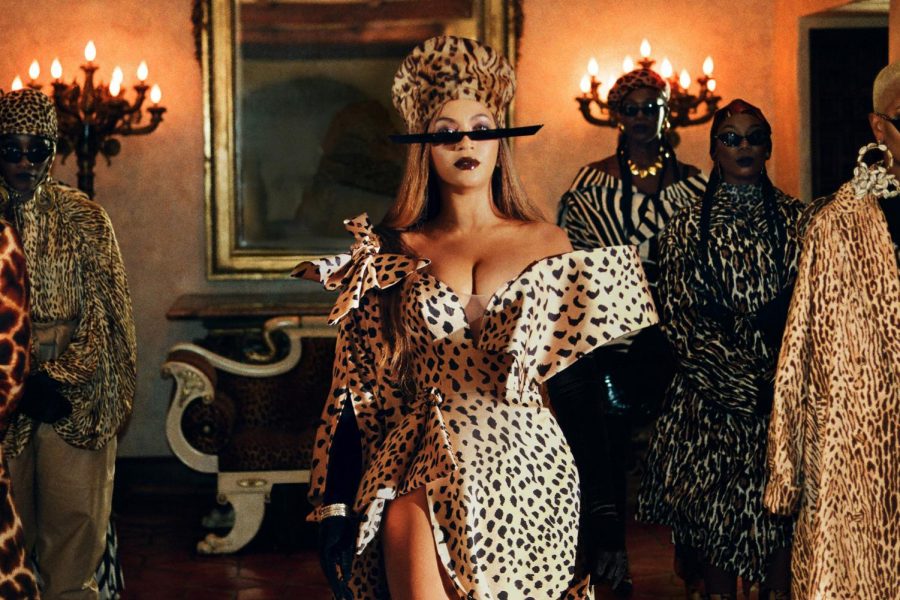Imagine the queen herself, Beyoncé Knowles Carter, telling millions of people around the world that they’re beautiful and everything for an hour and twenty-five minutes. That’s Black is King, a beacon of light and reprieve from the apocalyptic never-ending existential terror of 2020.
In Carter’s film, the audience follows the growth of a young Black king through the lens of Carter’s deluxe Lion-King-inspired album. The album features prominent African artists (such as Burna Boy), as well as the likes of Kendrick Lamar, Jay-Z, and Pharrell Williams. I have listened to the album several times and I am still in love with it; Carter truly adapted each collaborator’s unique style into each and every song. The film itself is full of stunning visuals and symbols, shimmering bright-colored outfits from Black designers, and interludes from men and women reflecting on identity and culture.
The much-awaited film has not been without critique- upon the release of the trailer earlier this year, many people were concerned that the film would portray Africa through the monotonous western lens it so often is seen through, rather than as the diverse and varying continent it is. Within the film, however, Carter was praised for doing her research and accurately referencing several cultural elements that she selected to place into the dreamscapes and warehouses and mansions her story glides through. The dazzling Carter deliberately steps away from the screen in a clear stance to allow these Black artists and their creations to shine on their own stage.

Carter also references movements like Pan-Africanism and Afrofuturism throughout her film. In one scene an overhead shot shows a crowd of people holding a gigantic American Flag shaded with red, green, and black from the Pan-African flag. Pan-Africanism is a movement that seeks to unite people of African descent after the African diaspora. This African-American flag is a symbol of Black liberation and international solidarity. It’s very interesting to research the symbols and elements in the film and understand their cultural contexts; The film is not meant to be educational, but it has sparked much-needed conversation and debate on “right” and “wrong” ways Africa should be portrayed in media. It would be refreshing to see more stories and creators developing these ideas and exploring these perceptions in the American mainstream.
Amid stunning Coachella performances and beloved album after album, it’s often hard to remember Beyoncé is a mere mortal. In the film, Carter is some suave omniscient guide in this small king’s journey. Like some prophet, she narrates beautiful lines between songs that explore the identity and overlooked power of Black communities. Though there were so many elements and references of the real world packed into it, there was a sense that we were watching this young king’s journey through dreams and abstracted pictures of the world. This feeling along with the dependence on music and form to communicate the story made the film feel very universal and connected to everything. In the beginning, Carter narrates, “Bless the body, born celestial. Beautiful and dark matter …You are welcome to come home to yourself. Let Black be synonymous with glory.”

She is trying to lead the king to find the divine within himself, reconnect with the powerful history that has been taken from so many African Americans. Carter is bringing the viewer with her to a realm of kings, gods, and powerful ancestors, and asking them to look within themselves and reclaim their own crowns and beauty, to remember there is pride and glory that can never be taken away from within. One of my favorite moments of the film was during “Brown Skinned Girl”, a love letter to dark-skinned girls. Carter is surrounded by Lupita Nyong’o, Kelly Rowland, and Naomi Campbell, whom she references within the song. This is also one of the only parts of the film that star non-Black POC, which has come with its own critique, but nods to the universal struggle of darker-skinned people, especially women, serenading them with an appreciation and love not always reflected in reality. Carter holds Kelly Rowland’s face in her arms and lovingly mouths the lyrics to her with an infectious smile. Rowland grins and looks away and there’s nothing but love and joy at that moment. Colorism is not a problem in Carter’s world for a second and the wholesome happiness radiating from that scene is so heart-warming to watch. There are so many moments and words in the film that just wash over you like this. The film is so genuine and empowering and stunning in so many different ways. To those of us disillusioned by the world and isolated in quarantine (especially BIPOC) today, this film is something that will take you away from that world for a moment into one of lively splendor and extravagant self-realizations.
5/5 STARS
